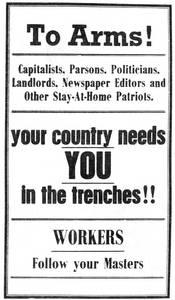Socialist Opposition to Conscription
The role of socialist groups, including the International Workers of the World (IWW), the Australian Socialist Party, the Socialist Labour Party and the Victorian Socialist Party, in defeating conscription has received much analysis. As Ian Turner has vividly documented, twelve IWW members were arrested just before the 1916 Referendum and given lengthy gaol sentences on charges of insurrection and arson just before the 1916 Conscription Referendum.[29] The prosecution was used by the government to seek to discredit the anti-conscription cause, as for example, headlined in one newspaper as “IWW Assassins Want You To Vote No”. Later, as key witnesses confirmed, nine out of the twelve were exonerated, and the political nature of their framing became apparent.[30]
Verity Burgmann’s recent analysis of the role of socialist groups at this time shows that, as in the case of Quaker and pacifist groups, socialist groups were in the forefront of opposition to the “boy conscription “ scheme in the years before the war.[31] In 1912, Harry Holland of the Australian Socialist Party was one of the parents prosecuted for refusing to allow his son to undergo military training. From the very start of the war, IWW leaders such as Tom Barker were among the few to challenge the war from an internationalist working class perspective, and the IWW at the time attracted a following of some 55,000 across Australia.[32] One of its most iconic anti-conscription antiwar initiatives was a July 1915 “call to arms” poster that urged workers to follow the example of their “stay-at-home” capitalist masters.[33] Within the wider trade union and worker movements, the IWW called for a general strike against any attempt to introduce conscription. The Victorian Socialist Party, led by Bob Ross, was the principal impetus for the formation of the No Conscription Fellowship, and cooperated closely with the IWW and the broader Australian Peace Alliance in anti-conscription public meetings.[34] Further, the Melbourne University student leader, Guido Barrachi, one of the founders of the Australian Community Party, was gaoled in Pentridge for three months in early 1918 for speaking out against the war in anti-conscription rallies.[35]
It was, in fact, one of the key Australian Socialist Party activists, W.R.Winspear, who penned the poem that that E.J.Holloway, the national secretary of the Trade Union Anti-Conscription Committee, credited with being “the most effective single piece of propaganda for our side, which decided the votes of perhaps ten of thousands of women”.[36] The poem was titled the “The Blood Vote” and included the lines: “They gave me a ballot paper,/ The grim death warrant of doom,/ And I smugly sentenced the man to death/In that dreadful little room”.[37]

